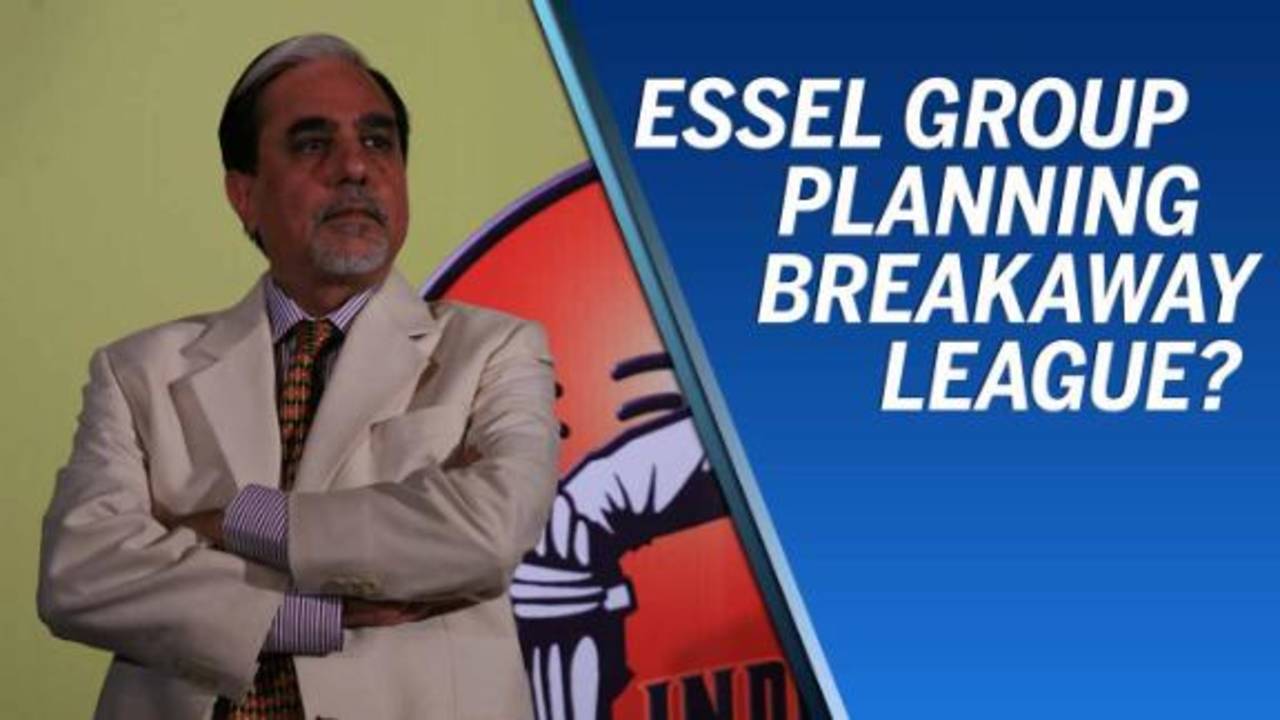ICC investigates plans for alternate cricket structure
The ICC is investigating the Essel Group's mooted plans for an alternative world cricket structure, even as former IPL chief Lalit Modi revealed he stepped away from the project after deciding it was not something he could deliver
ESPNcricinfo staff
30-Apr-2015
The ICC is investigating the Essel Group's mooted plans for an alternative world cricket structure, even as former IPL chief Lalit Modi revealed he stepped away from the project after deciding it was not something he could deliver.
An emergency ICC committee - comprising its chairman N Srinivasan, ECB's Giles Clarke, and CA's Wally Edwards - has been set up to investigate moves made by the Indian billionaire Subhash Chandra, owner of the Essel Group and also Zee TV, of which the subsidiary Ten Sports owns home international cricket television rights for numerous Full Member countries including Pakistan and Sri Lanka.
"Yes, we discussed it at our board meeting and the three-member committee is looking into the issue," Srinivasan told Indian Express. "At the moment we've very little information about the whole thing. We've to see whether this is something serious or just speculation. We've started the process and will report to the executive board once we get the facts."
ESPNcricinfo understands that the committee will also look into the recent activity of Modi and his business partner Dean Kino, the former Cricket Australia head of business and legal affairs and also a key figure in the development of the Champions League Twenty20.
Speaking to the Guardian, Modi said he had done some early work on Chandra's plans over several months, before stepping back. However, he warned against underestimating Chandra, who had previously bankrolled the rebel Indian Cricket League that was snuffed out by the emergence of the IPL - ironically under Modi's stewardship - and left around $2 million in unpaid wages for the players and staff who took part.
"I looked at the plan and discussed it. We had conversations for months - but I usually don't touch something I cannot deliver, and this I cannot," Modi said. "It's not something you can just do and launch - it will take years and it won't happen overnight. It is not putting a tournament together, it's about building the sport from the grassroots up.
"You have to understand Subhash Chandra as a man. If you do, you will know he goes after what he wants and he does not stop. Whether he will succeed is the billion-dollar question. Subhash is a powerful body no doubt but it is a foolish plan at the moment. But he does what he wants and I wish him all the luck. It could be very close, who knows? If he presses the button and puts the money on the table things could start very quickly. The ICC should be fearing him."
Another report, in the Sydney Morning Herald, has outlined plans for international players such as Michael Clarke and David Warner to be offered as much as $50 million each over 10 years to add their names and reputations to the breakaway venture. Modi said that players had been made aware of the project and that trust could be won by payments up front, but there were greater issues of logistics and infrastructure.
"I don't think players have signed anything yet but a few know about it," he said. "They will come, but it is too early for that. The plan requires billions up front. Trust would be a serious issue but they could overcome that with advance payments. If somebody had three or four billion to play around with, with it could be done very easily. Anything less? It would be very difficult.
"Logistics are the big issue and infrastructure the bigger issue. In my case we had one competition and had the cash and the infrastructure available, with partners and stadiums in place. On a green field project like this, where are the stadiums? They need to find them, create them or convert existing ones - the gestation period for that is quite long."
The ICC executive board has faced a wave of criticism following the adoption of a "Big Three" model in 2014 driven by the financially strongest boards in world cricket - India, Australia and England. The Big Three model was pushed through by current ICC chairman N Srinivasan as former BCCI president, outgoing ECB chairman but incoming president Giles Clarke, and CA chairman Wally Edwards over a six-month period. The nuts and bolts of the new administrative and revenue plan for the ICC was worked out by the backroom commercial executives of the three Boards. At the time, that group had comprised Kino, as general manager of legal and business affairs, Cricket Australia, Sundar Raman, chief operating officer, IPL, and John Perera, commercial director ECB.
The model changed the administrative structure and revenue distribution model of the international game, with most of the decision-making positions and finances gained by the cricket boards of India, England and Australia.
Srinivasan, Giles Clarke and Edwards are known to have discussed the possible breakaway at their most recent ICC meetings in Dubai earlier this month.
